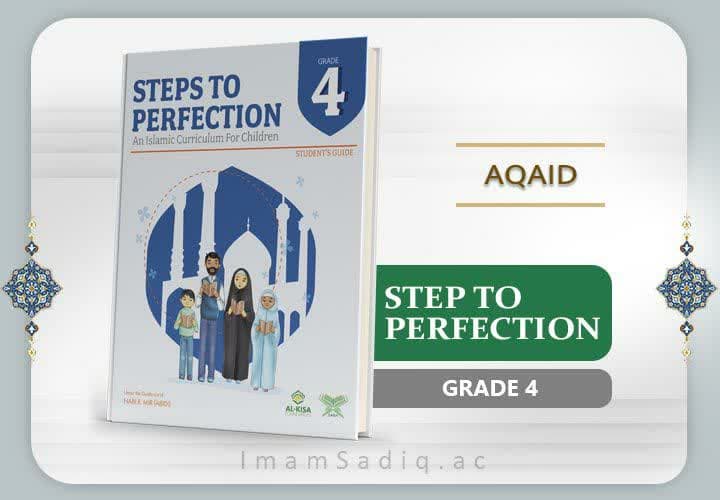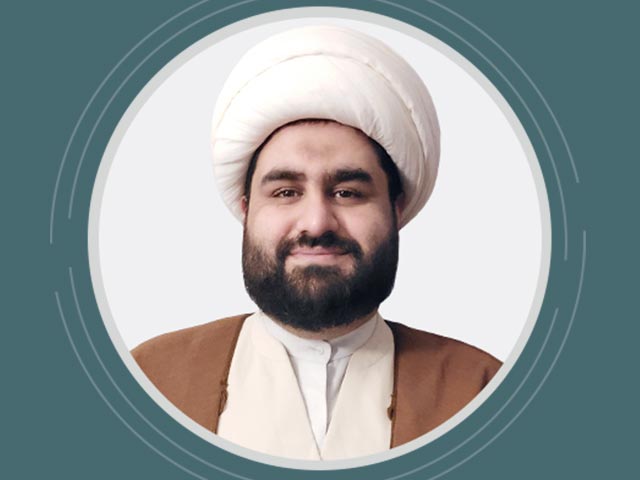Steps to Perfection (Grade 4)
in Steps to Perfection (Curriculum)Steps to Perfection Grade 4 by Al-Kisa Publications is a thoughtfully designed book aimed at helping young learners understand and appreciate core Islamic principles. Covering essential topics in beliefs (Aqaid), ethics, worship, and daily practices, this book offers a clear and engaging approach to foundational Islamic teachings. Written specifically for children ages 8 to 12, each lesson is crafted with relatable examples, simple explanations, and activities to foster spiritual growth and character development. Steps to Perfection serves as an ideal resource for parents and educators to guide children in developing a deeper connection with their faith, nurturing a balanced and righteous life from an early age.
The Uṣūl ad-Dīn are the basic 5 beliefs (or roots) of Islam. They are:
1. Tawḥīd: Belief that there is only one God, Allah
2. ʿAdālah: Belief in the justice of Allah
3. Nabūwwah: Belief in the Prophets sent by Allah
4. Imāmah: Belief in the 12 Imāms
5. Qiyāmah: Belief in the Day of Judgment
One of the very strong proofs for Allah’s existence is the proof from fiṭrah.
As Muslims, we believe in God. However, just
believing in God is not enough. We must also
believe that God is One and that there is no
other god besides Him. He has no partners.
He is the only Creator and the Sustainer of
the whole universe, and He has power over
all things. He is Ever-Living and never dies.
This belief is called tawḥīd (monotheism).
Al-Asmāʾ al-Ḥusnā refers to “The Beautiful
and Perfect Names” of Allah, although each
of them alone describe a particular quality.
Allah’s various powers are described by
His names or attributes.
When we say that Allah is as-Samīʿ, it means
that He is aware of every sound that is made,
whether it be the voice of a human being, or
the cry of an animal. He is aware of these
sounds at all times and anywhere in the world.
The word “al-Quddūs” means The
Holy. Al-Quddūs means that Allah is pure and
cleansed and away from any kind of impurity
or imperfection, whether that imperfection is
apparent or hidden.
Allah is al-Kabīr, which means He is the Great.
This is the opposite of the word ṣaghīr, which
means small. Kabīr is the greatness that
Allah has in His knowledge and power, and
someone who has these kinds of attributes
can help anyone. This is why we should turn
only to Allah, al-Kabīr, and only find peace
and confidence in His promises.
When we think about the word “justice”
sometimes we think that this means everyone
should be equal. We look at how some people
have more money than others, or better
health, for example and think it’s not fair when
people have less. Equality and justice are not
the same.
One of the Uṣūl ad-Dīn (Roots
of Religion) is Nabūwwah, which essentially
means that Allah sent us the Prophets to
teach us and guide us in order to obey Him.
Remember, knowing and understanding
the Uṣūl ad-Dīn is a requirement of being
Muslim. We will learn more about Nabūwwah
in this lesson.
Imāmah is a status given by Allah (swt). An
Imām cannot be chosen by people. This is
because people are not infallible, and they
can make mistakes. Only Allah (swt) knows
a person inside and out. Internally, He knows
his nīyyah (intentions), potential and abilities.
An Imām must be an example for people to
imitate and follow, and a person who makes
mistakes and commits sins can never be an
example of perfection. Thus, only Allah (swt)
can choose an Imām.
Imām al-Mahdī (ʿaj) has many titles, many of which we learned in
previous years such as: al-Mahdī ̄ (the Guided One), Al-Ḥujjah (Proof
of Allah), Ṣāḥib az-Zamān (the Living Master). In this lesson, we will
learn about the title al-Qāʾim, which means the Upright.
The fifth of the Uṣūl ad-Dīn is the belief in
Qiyāmah, the Day of Judgment.
Every Muslim must have faith that there
will come a day when everyone will die and
Allah will then bring them back to life and
judge them.

About this course
Join this engaging online course, based on the book Steps to Perfection for Grade 4 by Al-Kisa Publications, where young learners ages 8 to 12 will explore foundational Islamic principles and values in a simple and relatable way. Designed for kids to understand and connect with Islamic teachings, each lesson is crafted to make learning both enjoyable and meaningful. Through clear explanations, interactive examples, and guided discussions, students will gain insights into spirituality, character development, and everyday ethics, all at their own pace. Perfect for young minds embarking on their journey to self-betterment!






